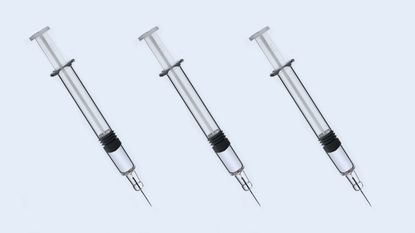

When Botox was introduced in 2002, it was widely scorned as a perfectly insane medical choice. Purposefully injecting your face with a toxin responsible for infectious disease for the sole purpose of looking a few years younger seemed laughably dangerous and shallow. But in the decade and a half since, Botox injections have become the most popular cosmetic procedure in the country by far—and medical professionals are constantly finding new ways to use the substance.
The paralyzing effect of botulism toxin is approved to combat ailments like migraines, crossed eyes (strabismus), and excessive sweating, and a study actually suggests that Botox injections might ease depression.
Researchers at the University of Texas-Austin tested four theories that: 1) Looking better makes a person feel better, 2) Less frowning makes for more positive social interaction, 3) Paralyzing frown muscles decreases signals to the brain to be sad, and 4) Botox injections actually reach your brain somehow.
They actually debunked... all four of these theories. Yet their subjects still felt less depressed across the board (or rather, experienced a remission of depression). In fact, they cite past research that nine out of 10 participants saw reductions in symptoms of major depressive disorder when treated with Botox. The only answer is, of course, more scientific inquiry.
In the mean time, it's exciting to consider how a cosmetic product once deemed shallow might actually fight one of the deadliest illnesses on the planet. Mull on that, judgy people.
Follow Marie Claire on Facebook for the latest celeb news, beauty tips, fascinating reads, livestream video, and more.
Stay In The Know
Marie Claire email subscribers get intel on fashion and beauty trends, hot-off-the-press celebrity news, and more. Sign up here.
-
 Zendaya's Method Dressing Marathon Is Over
Zendaya's Method Dressing Marathon Is OverShe found a new way to serve in custom Vera Wang.
By Halie LeSavage Published
-
 Bitten Lips Took Center Stage at Dior Fall 2024 Show
Bitten Lips Took Center Stage at Dior Fall 2024 ShowModels at the Dior Fall 2024 show paired bitten lips with bare skin, a beauty trend that will take precedence this season.
By Deena Campbell Published
-
 30 Spring Items That Solve My Expensive-Taste-on-a-Humble-Budget Dilemma
30 Spring Items That Solve My Expensive-Taste-on-a-Humble-Budget DilemmaSee every under-$300 spring item on my wish list.
By Natalie Gray Herder Published
-
 Gigi Hadid's Bright Orange Eyeshadow Look Is the Summer Beauty Inspo You Need
Gigi Hadid's Bright Orange Eyeshadow Look Is the Summer Beauty Inspo You NeedGigi Hadid shared the coolest makeup look on Instagram, the work of celebrity makeup artist Patrick Ta, featuring a jolt of sunshine-y orange eyeshadow.
By Emily Dixon Published
-
 Sophie Turner Dyed Her Hair Red Again and Sansa Stark Is Reborn
Sophie Turner Dyed Her Hair Red Again and Sansa Stark Is RebornSophie Turner was spotted at a baseball game Sunday sporting newly dyed red hair, while she later posted a snap of her transformation on Instagram.
By Emily Dixon Published
-
Lizzo Just Shared an Unedited Naked Selfie To "Change The Conversation About Beauty Standards"
“Normally I would fix my belly and smooth my skin but baby I wanted show u how I do it au natural.”
By Korin Miller Published
-
 Billie Eilish Completes Her Hair Transformation With a Bouncy Blonde Blowout
Billie Eilish Completes Her Hair Transformation With a Bouncy Blonde BlowoutAfter first debuting her blonde hair last month, Billie Eilish stunned with an even lighter bouncy blonde blowout in a new Instagram photo Monday.
By Emily Dixon Published
-
 Megan Thee Stallion Stuns With a Neon Pink Bob
Megan Thee Stallion Stuns With a Neon Pink BobMegan Thee Stallion debuted a gorgeous new look on Instagram Thursday: a neon pink bob, inspired by the anime The Disastrous Life of Saiki K.
By Emily Dixon Published
-
Chrissy Teigen's Rose Pink Hair Transformation Is Stunning
Chrissy Teigen revealed the final stage of her hair transformation on Instagram Tuesday, debuting a gorgeous rose pink shade with darker roots.
By Emily Dixon Published
-
Chrissy Teigen Revealed Her Cool Blonde Hair Transformation on Instagram
Chrissy Teigen underwent a hair transformation Sunday, courtesy of celebrity stylist Tracey Cunningham and a team from Los Angeles' MèCHE Salon.
By Emily Dixon Published
-
 Katie Holmes Shared the Cult Favorite Products Behind Her Radiant Skin
Katie Holmes Shared the Cult Favorite Products Behind Her Radiant SkinKatie Holmes shared the cult products behind her glowing skin in People's Beautiful Issue, revealing she's a big fan of the Dr. Barbara Sturm skincare line.
By Emily Dixon Published